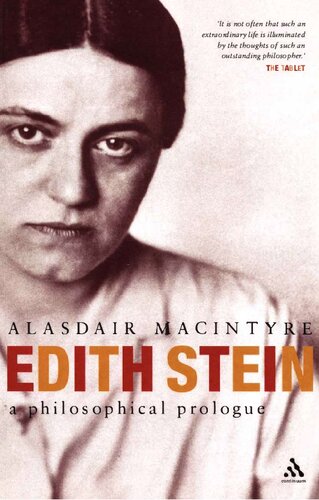

Most ebook files are in PDF format, so you can easily read them using various software such as Foxit Reader or directly on the Google Chrome browser.
Some ebook files are released by publishers in other formats such as .awz, .mobi, .epub, .fb2, etc. You may need to install specific software to read these formats on mobile/PC, such as Calibre.
Please read the tutorial at this link: https://ebookbell.com/faq
We offer FREE conversion to the popular formats you request; however, this may take some time. Therefore, right after payment, please email us, and we will try to provide the service as quickly as possible.
For some exceptional file formats or broken links (if any), please refrain from opening any disputes. Instead, email us first, and we will try to assist within a maximum of 6 hours.
EbookBell Team

4.1
20 reviews"This book is an attempt both to give some account of Edith Stein's beginnings as a philosopher and to understand her life-or at least the part of it treated in this book-as one kind of philosophical life possible in the twentieth century. The need for the first of these tasks arises from the general neglect of her philosophical work in the English-speaking world. There is no entry for Edith Stein in the Oxford & Cambridge Dictionaries of Philosophy, the Oxford Companion, or the Routledge Encyclopedia of Philosophy. In the Blackwell Companion to Continental Philosophy her name is not mentioned. So is her work as devoid of philosophical interest as this would suggest? One reason why her work has been undervalued may be that its significance can only be adequately understood viewed in its philosophical contexts, first as a contribution to phenomenological enquiry and later to Thomistic and other Neoscholastic enquiries, and secondly as a response to the condition of German philosophy in the first decades of the twentieth century. But to view it in this light it is necessary also to understand something of the course of German philosophy from the late nineteenth century onwards and the responses to its condition by Edith Stein's predecessors and contemporaries. So in order to explain and situate her work I need to tell a somewhat longer tale."